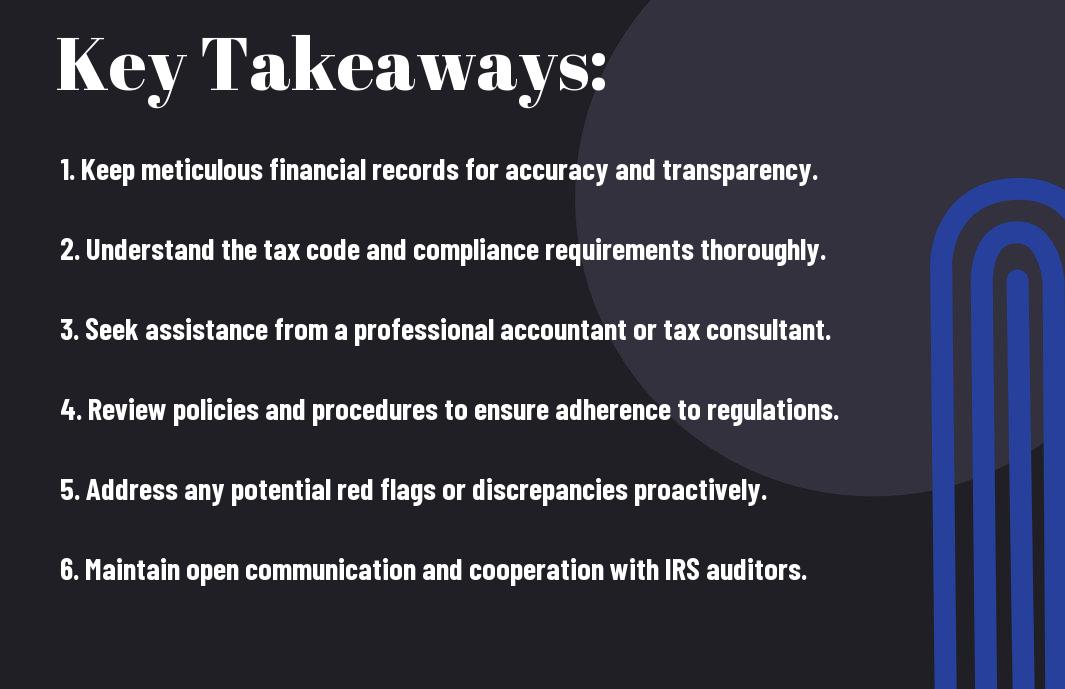How can small businesses prepare for an audit from the IRS?
Anticipating an audit from the Internal Revenue Service (IRS) can be a daunting prospect for any small business. While the process may seem overwhelming, there are steps you can take to ensure that you are well-prepared and can navigate the audit with confidence. By implementing proactive measures and organizing your records, you can demonstrate transparency and compliance, ultimately mitigating the risk of penalties or fines.
As a small business owner, it’s crucial to be aware of the potential pitfalls that could raise red flags during an audit. In this blog post, we will discuss how to avoid a tax audit: 7 tips for small business owners and cover important steps you can take to prepare for and navigate an audit from the IRS with confidence.
Key Takeaways:
- Keep accurate financial records: Small businesses should maintain meticulous financial records, including income statements, expense reports, and payroll records. Having organized and up-to-date records will not only make the audit process smoother but also demonstrate the business’s commitment to compliance.
- Seek professional guidance: It is important for small businesses to work with a certified public accountant or tax professional who can provide guidance on tax regulations and ensure the business is prepared for an IRS audit. Having expert advice can help navigate the complexities of tax laws and regulations.
- Understand the audit process: Small businesses should familiarize themselves with the audit process and be prepared to cooperate with the IRS. This includes understanding their rights during an audit and being transparent in providing requested documentation and information. Being knowledgeable about the audit process can help alleviate stress and ensure a smoother experience.

The Fundamentals of IRS Audits
One of the biggest fears for small business owners is the possibility of an IRS audit. An audit is an examination of your business’s financial information and accounting records to ensure that you have accurately reported your income and paid the correct amount of taxes.
Types of IRS Audits and What They Entail
There are several types of audits that the IRS may conduct, including correspondence audits, office audits, and field audits. In a correspondence audit, the IRS will request specific documentation or information by mail. An office audit involves a meeting with an IRS agent at their office, while a field audit takes place at your business location. Regardless of the type of audit, the IRS will review your financial records and may request additional documentation to support your tax return. This process can be time-consuming and daunting, but it’s important to cooperate fully and provide the requested information to the best of your ability to avoid further complications.
- Correspondence audits involve communication by mail and typically address specific issues or require specific documents.
- Office audits require an in-person meeting at an IRS office to discuss specific aspects of your tax return.
- Field audits involve an in-person visit by an IRS agent to your business location to thoroughly review your financial records.
This process can be time-consuming and daunting, but it’s important to cooperate fully and provide the requested information to the best of your ability to avoid further complications.
Know Your Rights as a Small Business Owner
As a small business owner, it’s important to familiarize yourself with your rights during an IRS audit. You have the right to be represented by a tax professional who can accompany you during the audit and help ensure that your rights are protected. Additionally, you have the right to confidentiality and fair treatment throughout the audit process. It’s crucial to understand these rights so that you can assert them if necessary and navigate the audit with confidence.
Preparing Your Documentation
Now that you know an audit from the IRS is a possibility, it’s important to start preparing your documentation. This involves gathering and organizing all your financial records, receipts, and other necessary documents to ensure that you are in compliance with tax laws and regulations.
Maintaining Accurate Financial Records
When preparing for an IRS audit, maintaining accurate financial records is crucial. This means keeping track of all your business expenses, income, and other financial transactions throughout the year. By maintaining organized and accurate records, you can easily provide the necessary documentation to support your tax return in the event of an audit. Any discrepancies or inconsistencies in your financial records can raise red flags during an audit and potentially lead to further investigation by the IRS. It’s essential that you keep thorough and accurate documentation to avoid any issues.
Essential Documents You Need to Retain
There are several essential documents that you need to retain when preparing for an IRS audit. These include but are not limited to, receipts for business expenses, invoices, bank statements, payroll records, tax forms, and any other documents related to your business finances. Not retaining these essential documents can put you at risk during an audit, as you will not be able to provide the necessary evidence to support your tax return.

Understanding Tax Deductions and Credits
Now that you understand the basics of preparing for an audit, it’s time to delve into the specifics of tax deductions and credits for small businesses. Tax deductions and credits can significantly reduce your taxable income and ultimately save you money. Deductions reduce the amount of income that is subject to taxation, while credits directly reduce your tax liability. It’s essential to understand which deductions and credits you qualify for as a small business owner to ensure that you’re taking full advantage of available tax benefits.
Common Deductions Small Businesses Can Claim
When it comes to tax deductions, there are several common expenses that small businesses can claim to reduce their taxable income. These may include business expenses such as rent, utilities, office supplies, and employee wages. Furthermore, you can deduct a percentage of expenses related to operating your home as a business, as well as expenses related to travel, meals, and entertainment for business purposes. Be sure to keep detailed records of each expense and consult with a tax professional to determine what can be claimed as a deduction.
Red Flags That Can Prompt an Audit
While taking advantage of tax deductions and credits is essential, it’s also crucial to be aware of potential red flags that can prompt an audit from the IRS. One red flag that can attract IRS attention is claiming excessive deductions or credits that are not supported by adequate documentation. Another potential red flag is filing inconsistent tax returns from year to year or reporting income that doesn’t match what has been reported by other parties, such as clients or vendors. It’s important to ensure that your tax filings are accurate and in line with all applicable regulations to avoid triggering an audit.
Implementing Robust Accounting Practices
Lastly, it is important to implement robust accounting practices to ensure that your financial records are accurate and organized. This will not only help you in the event of an audit, but also provide you with clear insights into the financial health of your small business.
Choosing the Right Accounting Software for Your Business
When it comes to choosing the right accounting software for your business, there are a few key factors to consider. Firstly, you want to ensure that the software is user-friendly and intuitive, so that you can easily input and track your financial data. Additionally, look for features such as automatic bank reconciliations, expense tracking, and customizable reporting options. It’s also important to consider the scalability of the software, as your business grows, you want to ensure that the software can accommodate your changing needs. Strong accounting software can streamline your processes and improve the overall accuracy and efficiency of your financial record-keeping.
The Role of Professional Accountants in Audit Preparation
Professional accountants can play a crucial role in helping you prepare for an audit from the IRS. They can review your financial records, identify potential red flags, and make recommendations for improving your accounting practices. Their expertise can also provide you with peace of mind, knowing that your financial records are in order. Having a professional accountant on your side during an audit can significantly reduce the stress and uncertainty that often accompanies the process. Strong professional accountants can guide you through the audit process, represent you before the IRS, and help ensure that you are prepared for any challenges that may arise.
 “`html
“`html
Navigating the Audit Process
After receiving notice of an audit from the IRS, it’s important to understand the process and know what to expect. Navigating an audit can be a daunting task, but with proper preparation and understanding, you can effectively handle the situation and ensure that your small business comes out on the other side unscathed.
What to Expect When Being Audited
When your small business is being audited by the IRS, it’s essential to be prepared for a thorough examination of your financial records. The IRS will typically request specific documents and information related to your tax return, such as receipts, invoices, bank statements, and other financial records. It’s crucial to respond to these requests promptly and accurately, as failing to do so could lead to further scrutiny and potential penalties.
During the audit, an IRS representative will review your records and may ask questions to clarify any discrepancies or inconsistencies. Be prepared to provide clear and concise explanations for any issues that arise, as this can help expedite the process and demonstrate your cooperation.
How to Interact with IRS Representatives
When interacting with IRS representatives during the audit, it’s important to remain professional and courteous at all times. Keep in mind that the IRS employees are simply doing their job, and maintaining a respectful demeanor can help facilitate a smoother audit process.
Cooperate fully with the IRS representatives and provide the information they request in a timely manner. Avoid being evasive or uncooperative, as this can raise red flags and potentially prolong the audit process.
“`
Legal Considerations and Support
However, before facing an audit from the IRS, it’s important to understand the legal considerations and support available to you as a small business owner. This can help you navigate the process with confidence and ensure that you are protected throughout the audit. It’s also important to have a clear understanding of why the IRS might choose to audit your small business. For more information on this, take a look at Why the IRS might audit your small business.
When to Hire a Tax Professional or Attorney
When facing an audit from the IRS, it’s crucial to know when to seek support from a tax professional or an attorney. If you feel overwhelmed by the process or if you are unsure of how to respond to IRS requests, it may be time to hire a professional. A tax professional can review your financial records, help you prepare for the audit, and represent you before the IRS. Additionally, an attorney can provide legal support and guidance, ensuring that your rights are protected throughout the process. In some cases, hiring a tax professional or attorney can significantly reduce the stress of an audit and improve your chances of a successful outcome.
Legal Protections and Paths of Appeal
If you disagree with the findings of the IRS audit, you have legal protections and paths of appeal available to you. It’s important to understand that you have the right to appeal the decision of the IRS, and you can seek support from a tax professional or attorney to navigate this process. By exercising your right to appeal, you can present additional evidence, raise objections, and ultimately seek a fair resolution. Understanding these legal protections and paths of appeal is essential in ensuring that you can defend your position and protect your small business from unnecessary penalties or adverse consequences.
Developing an Ongoing Audit Readiness Strategy
Lastly, it’s important to have a plan in place to ensure that your small business is always ready for an audit from the IRS. Developing an ongoing audit readiness strategy can help you avoid any last-minute scramble if the IRS comes knocking on your door. This strategy involves creating a year-round preparation plan and utilizing internal audits to stay prepared.
Creating a Year-Round Preparation Plan
One of the most important steps in developing an ongoing audit readiness strategy is to create a year-round preparation plan. This means consistently keeping your financial records updated and organized, as well as staying informed about any changes in tax laws or regulations that may impact your business. By doing so, you can avoid potential penalties and fines for non-compliance with IRS regulations. Make sure to regularly review and reconcile your financial statements, bank statements, and tax filings to ensure accuracy and completeness. Additionally, maintaining good communication with your accountant or tax professional can help you stay ahead of any potential issues and address them proactively.
Utilizing Internal Audits to Stay Prepared
Another key aspect of your ongoing audit readiness strategy is to utilize internal audits to stay prepared. Conducting regular internal audits of your financial records and processes can help identify any discrepancies or areas of non-compliance before they become larger issues. By doing so, you can identify and address potential red flags that may attract the attention of the IRS. Internal audits also provide an opportunity to evaluate the effectiveness of your internal controls and make any necessary improvements to strengthen your financial reporting processes. Remember, the goal of internal audits is to ensure that your business is always ready for an external audit from the IRS.
Conclusion
Considering all points, it is essential for small businesses to prepare for an audit from the IRS in order to minimize the risk of penalties and ensure compliance with tax regulations. By maintaining accurate and organized financial records, keeping detailed documentation of business transactions, and seeking professional assistance from an accountant or tax advisor, you can effectively prepare for an IRS audit and demonstrate your business’s commitment to compliance. Additionally, conducting internal audits and regularly reviewing your financial records can help you identify any potential issues before they become problematic during an IRS audit.
Ultimately, being proactive and thorough in your preparation for an IRS audit can help you avoid potential penalties and legal issues, as well as ensure a smooth and efficient audit process. By following these steps and staying informed about tax regulations and requirements, you can strengthen your business’s financial integrity and maintain a positive relationship with the IRS.
FAQ – Small Business IRS Audit Preparation
Q: Why might a small business be audited by the IRS?
A: Small businesses may be audited by the IRS for a variety of reasons, including discrepancies in tax filings, unusually high deductions or credits, or random selection. It’s important for small businesses to be prepared for an audit at any time.
Q: What steps can small businesses take to prepare for an IRS audit?
A: Small businesses can prepare for an IRS audit by maintaining accurate and organized financial records, including receipts, invoices, and bank statements. It’s also important to be familiar with tax laws and regulations, and to have a clear understanding of how the business operates financially. Additionally, consulting with a tax professional can help ensure that everything is in order before an audit occurs.
Q: What should small business owners do if they receive a notice of an IRS audit?
A: If a small business receives a notice of an IRS audit, it’s important to respond promptly and cooperatively. Gather all relevant financial documents and records, and consider seeking professional assistance from a tax accountant or attorney who has experience with IRS audits. Being transparent and providing the requested information in a timely manner can help the audit process go more smoothly.

